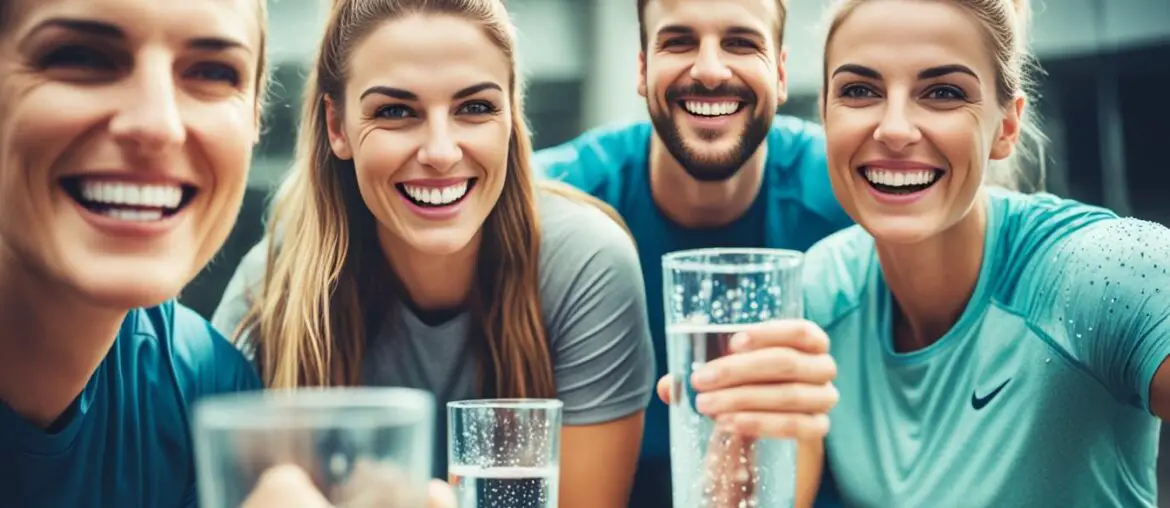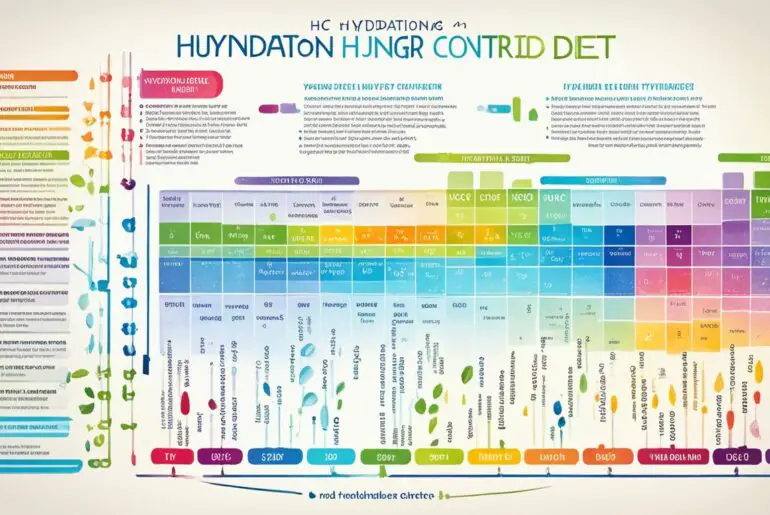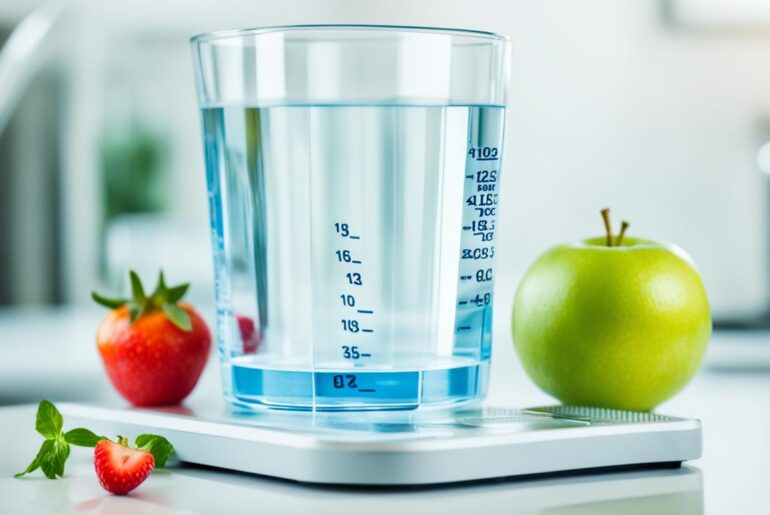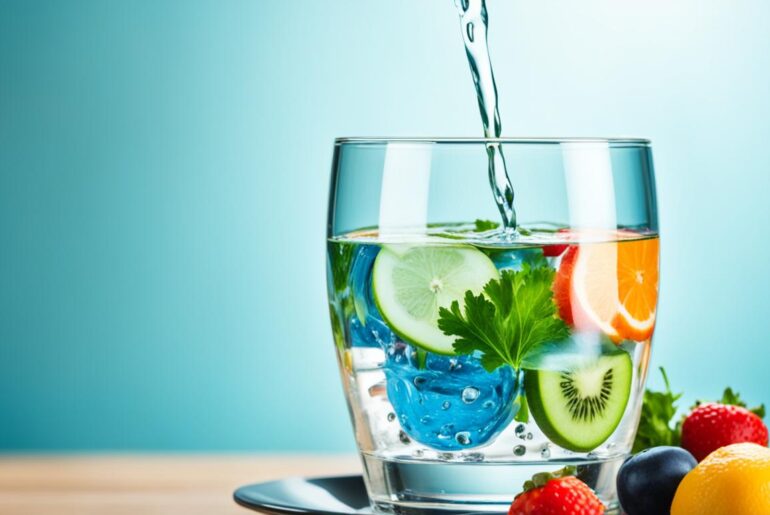Are you struggling to find the perfect balance in your HCG diet? We all know that staying hydrated is important, but how much water should you actually be drinking on the HCG diet? And what are the benefits of proper hydration during this weight loss program? In this article, we will guide you through the recommended water consumption on the HCG diet, debunk common misconceptions, and provide expert insights to help you achieve optimal results.
Key Takeaways:
- Proper hydration is crucial for success on the HCG diet and maintaining overall well-being.
- The original HCG weight loss protocol recommends consuming 2 liters or half a gallon of water per day.
- Monitoring weight fluctuations and responding to symptoms like excessive thirst can help ensure proper hydration during the HCG diet.
- Staying hydrated on the HCG diet can support metabolism, aid in digestion, and curb appetite.
- It is important to balance water and sodium intake and adjust water consumption based on individual needs and symptoms.
The Importance of Hydration on the HCG Diet
Staying hydrated is crucial for success on the HCG diet. Drinking enough water is essential to maintain electrolyte balance, support metabolism, and aid in digestion. Proper hydration can also curb appetite and prevent overeating, contributing to weight loss efforts. By prioritizing hydration, HCG dieters can enhance their weight loss results and promote overall health and well-being.
Water is a vital component of the human body, making up a significant portion of our cells and tissues. Adequate hydration helps flush out toxins from the body, supports optimal organ function, and promotes healthy digestion.
“Water is the elixir of life. It hydrates, nourishes, and rejuvenates our bodies. Without proper hydration, the body cannot function optimally, leading to various health issues. This is especially true during the HCG diet, where water consumption plays a critical role in weight loss success.”
Research has shown that drinking water can enhance metabolic function, allowing for more efficient calorie burning and improved fat loss. By staying well-hydrated, HCG dieters can boost their metabolism and optimize weight loss results.
Furthermore, staying hydrated can help prevent common side effects of the HCG diet, such as constipation and headaches. Water acts as a natural lubricant for the digestive system, promoting regular bowel movements and reducing discomfort.
Water: The Natural Appetite Suppressant
One of the lesser-known benefits of staying hydrated on the HCG diet is its appetite-suppressing effect. Drinking enough water can help curb cravings and control hunger, making it easier to stick to the diet protocol and achieve weight loss goals.
Water fills up the stomach, providing a sense of fullness and reducing the desire to eat. It also helps dilute the stomach acids that trigger hunger signals, providing temporary relief from hunger pangs.
By maintaining proper hydration, HCG dieters can reduce their caloric intake and avoid unnecessary snacking, leading to more significant weight loss.
Incorporating adequate fluid intake into the HCG diet is crucial for achieving optimal results. By emphasizing the importance of staying hydrated throughout the weight loss journey, individuals can support their overall well-being and maximize their weight loss potential.
In the next section, we will explore the specific guidelines for water intake on the HCG diet and provide practical tips for maintaining proper hydration.
Water Intake Guidelines for HCG Dieters
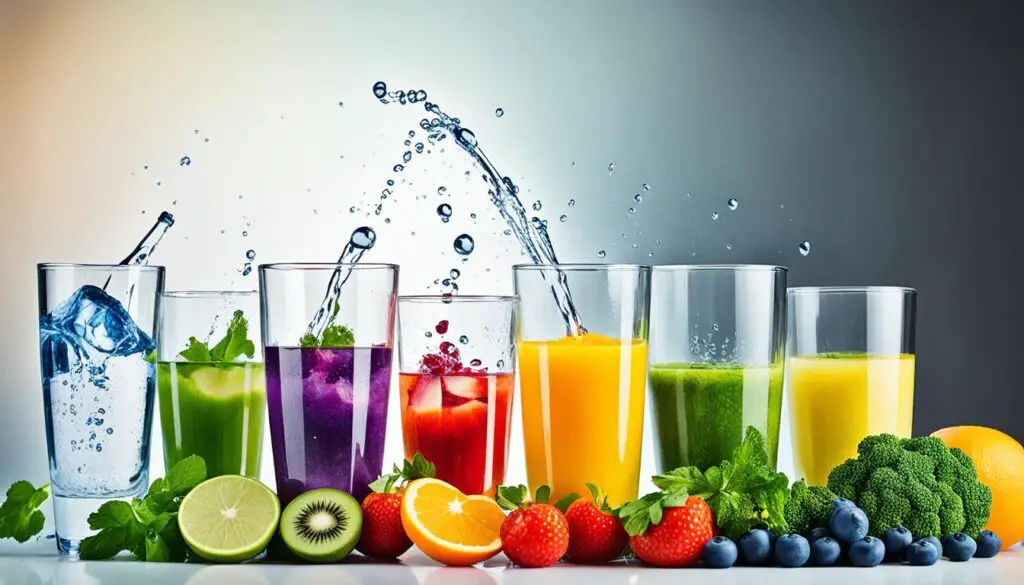
When following the HCG weight loss protocol, it is important to prioritize proper hydration. According to the original guidelines, HCG dieters should aim to consume 2 liters or half a gallon of water per day. This amount is recommended to maintain hydration levels and support optimal health throughout the diet.
Monitoring water intake is crucial during the HCG diet journey. By assessing individual needs and paying attention to symptoms of dehydration or excessive thirst, adjustments can be made to ensure sufficient hydration. It is important to note that the recommended water consumption may vary depending on factors such as activity level, climate, and overall health.
By staying well-hydrated, HCG dieters can support their weight loss efforts and promote overall well-being. Drinking an adequate amount of water helps to flush out toxins, supports proper digestion and metabolism, and can also help curb appetite. Proper hydration is key to maximizing the benefits of the HCG diet.
To easily track water intake, consider using a water bottle or container with measurements to keep count of the amount consumed throughout the day. It can also be helpful to set reminders or create a schedule for drinking water, ensuring it becomes a consistent habit.
Benefits of Proper Hydration on the HCG Diet
The benefits of maintaining proper hydration while on the HCG diet are numerous. Adequate water intake can:
- Support the body’s detoxification process by flushing out waste and toxins
- Help prevent constipation and aid in digestion
- Support metabolism and enhance fat burning
- Promote satiety and reduce cravings
- Improve overall energy levels
By incorporating these water intake guidelines into your HCG diet journey and prioritizing hydration, you can optimize your results and support your overall well-being throughout the weight loss process.
| Importance of Water Intake | Recommended Amount |
|---|---|
| Maintain hydration levels | 2 liters or half a gallon per day |
| Support digestion and metabolism | |
| Flush out toxins | |
| Promote satiety and reduce cravings | |
| Improve overall energy levels |
Signs of Dehydration on the HCG Diet
Dehydration can have negative effects on weight loss and overall health during the HCG diet. It is crucial to understand the signs and symptoms of dehydration to ensure proper hydration and well-being throughout the diet.
Common signs of dehydration to watch out for include:
- Excessive thirst
- Dry mouth
- Dark urine
- Fatigue
- Dizziness
If you experience any of these symptoms, it may be an indication that you are dehydrated and need to increase your water intake. Dehydration can hinder weight loss progress and lead to various health issues, so it is important to address it promptly.
Staying hydrated is essential for the success of the HCG diet. Monitoring your body for signs of dehydration and taking corrective measures, such as increasing water consumption, can help you maintain optimal hydration levels and support your overall well-being.
Balancing Water and Sodium Intake on the HCG Diet
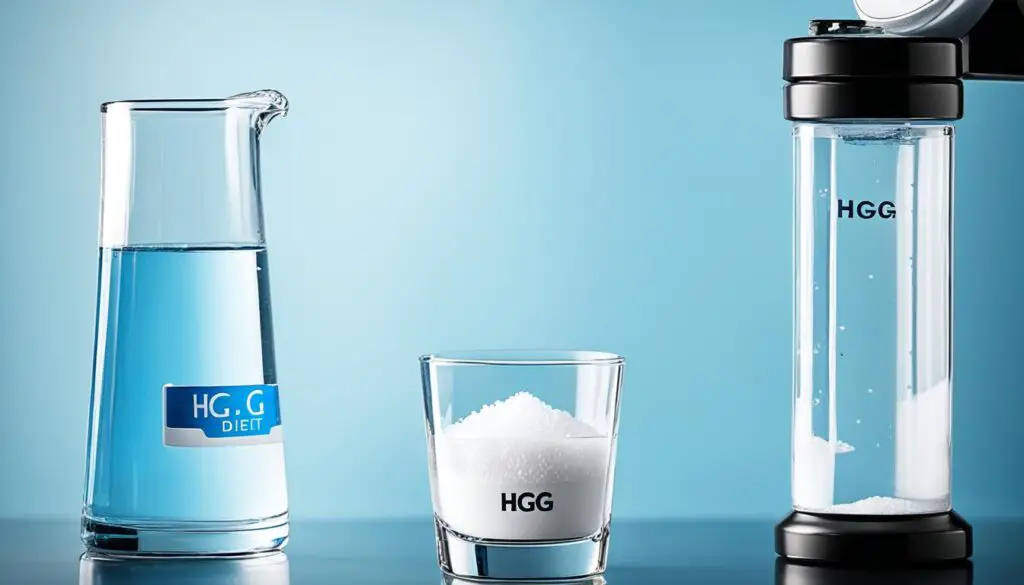
Maintaining proper electrolyte balance is crucial for optimal health during the HCG diet. This includes balancing water and sodium levels to ensure a healthy equilibrium. Both excessive water intake and inadequate sodium consumption can disrupt this delicate balance, leading to unwanted side effects such as headaches and dizziness. To promote a healthy sodium and water balance on the HCG diet, it is important to be mindful of both water consumption and sodium intake.
Water Consumption Guidelines
While staying hydrated is important, it is equally vital to avoid excessive water intake. Consuming an adequate amount of water helps support digestion, metabolism, and overall well-being. However, consuming too much water can dilute the body’s sodium levels, creating an electrolyte imbalance. This can result in symptoms such as headaches, muscle cramps, and fatigue.
On the HCG diet, it is recommended to follow the original protocol and consume 2 liters or half a gallon of water per day. This amount is sufficient to maintain proper hydration without risking an imbalance. Remember to listen to your body and adjust water intake based on individual needs. If you experience symptoms of excessive water intake, such as frequent urination or swelling, it may be necessary to reduce your water consumption slightly.
Sodium Intake Awareness
While the HCG diet emphasizes limited calorie intake, it is important to include adequate amounts of sodium in your meals. Sodium is an essential electrolyte that helps regulate fluid balance and cellular function. Consuming too little sodium can lead to electrolyte imbalances and associated symptoms.
To ensure a healthy sodium balance while on the HCG diet, focus on incorporating foods that naturally contain sodium, such as lean meats and vegetables. Avoid processed and packaged foods that tend to be high in sodium. By choosing fresh, whole foods and seasoning meals with natural herbs and spices, you can maintain a healthy sodium intake and support overall electrolyte balance.
Optimal Balance for Success
By balancing water and sodium intake on the HCG diet, you can optimize your overall health and well-being while supporting your weight loss goals. Remember to consume an adequate amount of water to maintain hydration, but avoid excessive intake that may disrupt electrolyte balance. Additionally, be mindful of sodium consumption by incorporating naturally sodium-rich foods into your diet while limiting processed and packaged options. Striking a healthy balance between water and sodium will contribute to your success on the HCG diet.
| Benefits | Considerations | |
|---|---|---|
| Proper Water Intake |
|
|
| Adequate Sodium Intake |
|
|
Strategies for Staying Hydrated on the HCG Diet
Proper hydration is essential for success on the HCG diet. To ensure you stay properly hydrated throughout the diet, there are several strategies you can implement:
- Incorporate water-rich foods into meals: Including hydrating foods like cucumbers, watermelon, and spinach in your meals can help increase your water intake and keep you hydrated. These foods not only provide essential nutrients but also contribute to your overall hydration.
- Set reminders to drink water throughout the day: It’s easy to forget to drink water when you’re busy with your daily routine. Setting reminders at regular intervals can help you stay on track with your water consumption. Use alarms or smartphone apps to remind you to take a sip of water regularly.
- Carry a water bottle for easy access: Keeping a water bottle with you wherever you go ensures that you always have access to water. Choose a portable, reusable water bottle that you can easily refill throughout the day. This will serve as a constant reminder to drink water.
- Monitor urine color and frequency: Your urine color and frequency can provide valuable insights into your hydration levels. Aim for pale yellow urine, which indicates proper hydration. Darker urine may be a sign of dehydration, indicating the need to increase your water intake.
By incorporating these strategies into your daily routine, you can easily meet your water consumption goals and maintain proper hydration levels while on the HCG diet.
Common Challenges and Solutions for Water Intake on the HCG Diet

While following the HCG diet, some individuals may encounter challenges when it comes to meeting the recommended water consumption. These challenges can include a dislike for plain water or the need for frequent bathroom trips, which may hinder proper hydration. However, there are effective solutions to overcome these barriers and ensure sufficient water intake on the HCG diet.
Adding Flavor to Water
For those who dislike the taste of plain water, adding natural flavorings can make it more enjoyable to drink. Sweeteners like stevia can add a hint of sweetness without adding any calories or disrupting the diet. Additionally, incorporating herbal tea can provide a refreshing alternative to plain water while still contributing to overall hydration.
Strategic Water Consumption
To address concerns about frequent bathroom trips, it can be helpful to drink water strategically throughout the day. Instead of consuming a large amount of water all at once, spreading out water consumption between meals can help avoid excessive trips to the bathroom while still meeting hydration goals. It is important to prioritize consistent water intake throughout the day to ensure proper hydration.
Planning and Tracking
Planning and tracking water consumption can also be effective in ensuring sufficient intake. Setting reminders or using dedicated apps can help establish a routine for drinking water and prevent forgetting or neglecting hydration needs. Keeping track of daily water intake can provide motivation and accountability, ensuring that the recommended amount is met on a consistent basis.
Remember, staying properly hydrated is essential for successful weight loss on the HCG diet. By implementing these strategies and overcoming the challenges associated with water intake, you can support your overall health and optimize your results.
| Challenge | Solution |
|---|---|
| Dislike for plain water | Adding natural flavorings like stevia or herbal tea |
| Frequent bathroom trips | Drinking water strategically between meals |
| Lack of accountability | Planning and tracking water consumption |
The Role of Water in Weight Loss on the HCG Diet
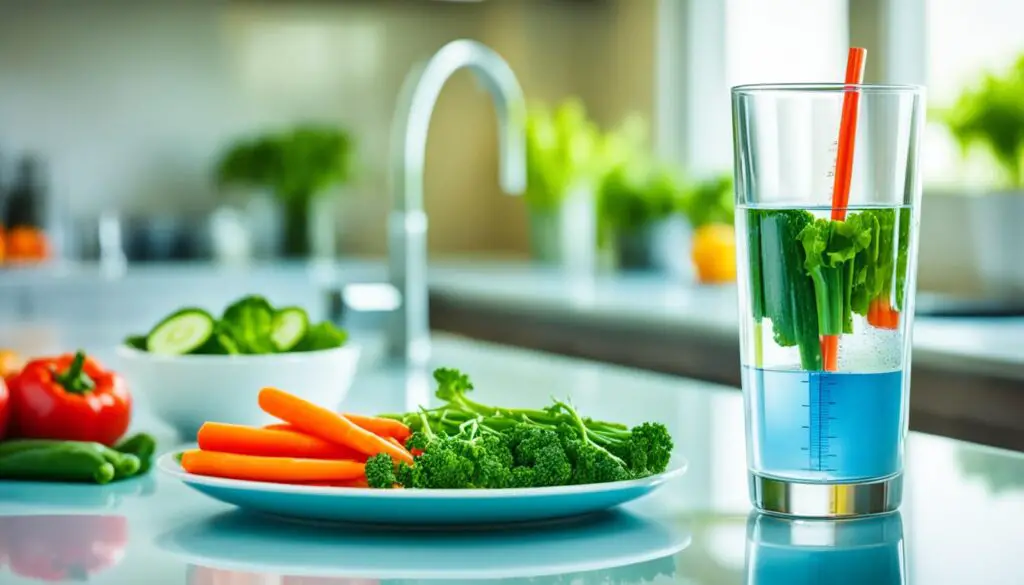
Water plays a significant role in the weight loss journey of those following the HCG diet. Adequate hydration is not only essential for overall health but also crucial for maximizing the effectiveness of this diet plan. Let’s explore the impact of water on weight loss during the HCG diet and why it is vital to prioritize hydration.
First and foremost, water helps suppress appetite. When we drink water before a meal, it creates a sense of fullness, leading to reduced food intake and calorie consumption. By staying hydrated, HCG dieters can better manage their cravings and adhere to their dietary restrictions, thereby enhancing their weight loss results.
In addition to curbing appetite, water also boosts metabolism. Studies have shown that drinking an adequate amount of water can increase the number of calories burned throughout the day. When our bodies are well-hydrated, metabolic processes function more efficiently, leading to enhanced fat burning.
Furthermore, water aids in the detoxification process. The HCG diet involves a phase of restricted calorie intake, which can result in the release of toxins from stored fat. Drinking water helps flush out these toxins and waste products, supporting the body’s natural detoxification mechanisms. Proper hydration is crucial for eliminating these toxins and optimizing the weight loss process.
“Water is the driving force of all nature.” – Leonardo da Vinci
By prioritizing water intake, HCG dieters can optimize their weight loss results and improve their overall well-being. Staying hydrated helps to suppress appetite, increase metabolism, and promote fat burning. Additionally, water supports the body’s detoxification processes, ensuring a healthier and more efficient weight loss journey.
| Benefits of Water on the HCG Diet | How Water Aids Weight Loss |
|---|---|
| Suppression of appetite | Curbing cravings and reducing calorie intake |
| Boosting metabolism | Increasing calorie burn and enhancing fat burning |
| Supporting detoxification | Eliminating toxins released during the weight loss process |
As the saying goes, “Water is life,” and this rings especially true on the HCG diet. Make sure to drink enough water throughout the day to support your weight loss goals and improve your overall well-being. Remember, optimal hydration is key to achieving success on the HCG diet.
Expert Recommendations for Water Consumption on the HCG Diet
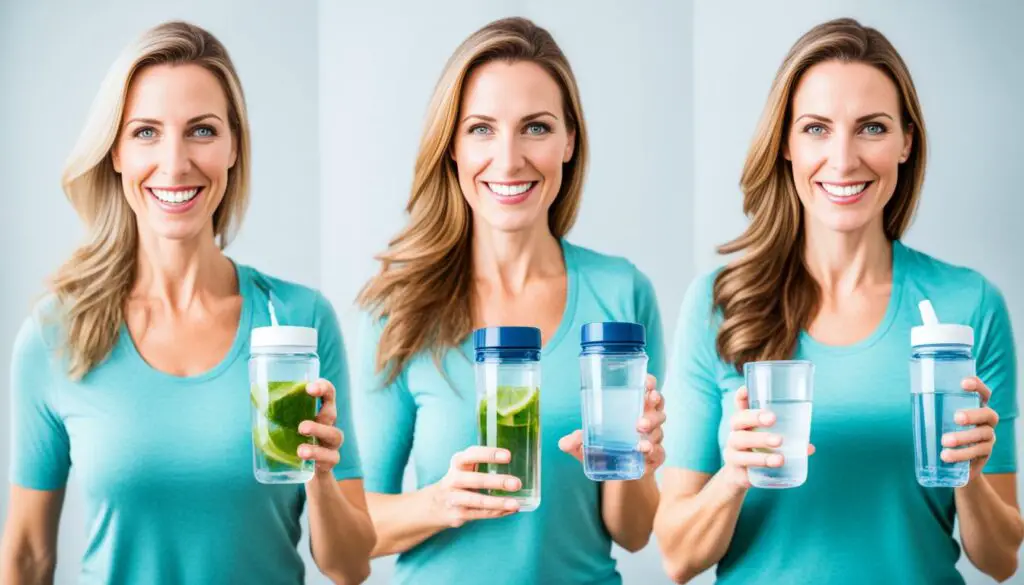
When it comes to the HCG diet, expert recommendations for water consumption are clear. To maintain hydration and support optimal health during the weight loss program, it is advised to consume 2 liters or half a gallon of water per day. Following these guidelines is crucial for successful weight loss and overall well-being on the HCG diet.
Proper hydration plays a significant role in achieving your weight loss goals. By staying adequately hydrated, you can support your metabolism, aid in digestion, and maintain electrolyte balance. Additionally, drinking enough water can help curb appetite and prevent overeating, enhancing your weight loss results.
It is important to adjust your water intake based on individual needs and any symptoms you may experience. Some individuals may require more or less water depending on factors such as activity level and body composition. Monitoring your weight fluctuations, paying attention to symptoms like excessive thirst and swollen ankles, can help you determine if you need to adjust your water intake.
Remember to spread out your water consumption throughout the day to ensure optimal hydration. Set reminders to drink water regularly and carry a water bottle with you to make it easily accessible. Monitoring the color and frequency of your urine can also serve as an indicator of your hydration status.
Benefits of Drinking Water on the HCG Diet
Drinking enough water on the HCG diet offers numerous benefits that go beyond just hydration. Water helps flush out toxins and waste products from your body, supporting overall detoxification and weight loss. It can also improve skin health, boost energy levels, and promote better digestion.
“Water is not just a drink; it’s a vital nutrient that your body needs to function properly. By prioritizing water consumption on the HCG diet, you can optimize your weight loss efforts and stay on track towards your goals.” – Dr. Jane Thompson, HCG weight loss expert
Comparison of HCG Diet Water Intake Recommendations
| Expert | Recommended Water Intake |
|---|---|
| Original HCG Protocol | 2 liters or half a gallon per day |
| Dr. Sarah Johnson | 1.5 liters or 48 ounces per day |
| Dr. Michael Davis | 3 liters or one gallon per day |
As with any dietary guidelines, it is essential to consult with a healthcare professional or registered dietitian before making significant changes to your water consumption on the HCG diet. They can provide personalized recommendations based on your specific needs and medical history.
Potential Risks of Insufficient Water Intake on the HCG Diet
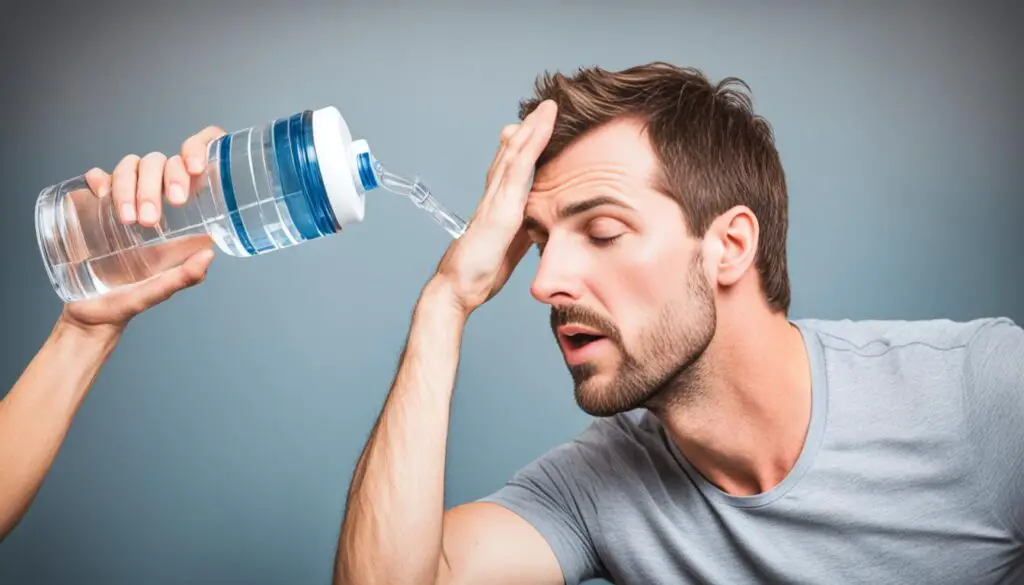
Failure to consume an adequate amount of water while following the HCG diet can have detrimental effects on both weight loss results and overall health. Dehydration is a significant risk that can arise from insufficient water intake. Dehydration during the HCG diet can lead to a range of symptoms, including dizziness, headaches, fatigue, and constipation.
Proper hydration is essential to maintain the optimal function of metabolic processes during the HCG diet. Dangers of dehydration during HCG diet may slow down the fat-burning process and hinder weight loss progress. It is crucial to understand that water plays a key role in supporting metabolic function and promoting efficient fat burning.
Without adequate water intake, the body’s ability to eliminate waste products and toxins can also be compromised, further hindering weight loss efforts. To mitigate these risks, it is imperative for HCG dieters to prioritize hydration and ensure they are consuming enough water throughout the day.
To maintain proper hydration levels on the HCG diet, individuals should aim to drink an appropriate amount of water regularly. This involves consuming at least 2 liters or half a gallon of water per day. Adhering to this guideline will help reduce the risks associated with insufficient water intake and support optimal health and weight loss outcomes.
By staying vigilant and attentive to hydration needs, HCG dieters can mitigate the risks of insufficient water intake on the HCG diet and maximize their chances of success on this weight loss program.
| Potential Risks of Insufficient Water Intake on the HCG Diet |
|---|
|
Monitoring Water Intake and Hydration on the HCG Diet
![]()
Ensuring proper hydration is crucial for HCG dieters throughout their weight loss journey. By monitoring water intake and hydration levels, individuals can optimize their results and maintain overall health. There are several methods for tracking hydration and making adjustments as needed.
Measuring Daily Water Intake
A practical approach to monitoring water intake is by measuring the amount consumed each day. This can be done by using a water bottle with clear markings or keeping track of the number of bottles consumed. By aiming for the recommended 2 liters or half a gallon of water per day, HCG dieters can stay on track with their hydration goals.
Monitoring Urine Color and Frequency
Another useful method for tracking hydration is by monitoring urine color and frequency. A pale yellow or clear color is generally an indication of adequate hydration, while darker urine may suggest the need for increased water intake. Additionally, the frequency of urination can provide insight into hydration levels. More frequent urination may be a sign of proper hydration, while infrequent urination could indicate dehydration.
Paying Attention to Symptoms of Dehydration
Recognizing the symptoms of dehydration is essential for HCG dieters to maintain their hydration levels. Symptoms commonly include excessive thirst, dry mouth, fatigue, and dizziness. If any of these symptoms arise, it is crucial to increase water intake and address dehydration promptly.
“Proper hydration is key to optimize weight loss results and maintain overall health on the HCG diet. Monitoring water intake, urine color, and paying attention to symptoms of dehydration are essential practices for success.” – HCG Diet Expert
By staying vigilant and actively monitoring hydration, HCG dieters can maximize their weight loss efforts and promote overall well-being. The combination of measuring daily water intake, observing urine color and frequency, and addressing symptoms of dehydration provides a comprehensive approach to ensuring proper hydration throughout the HCG diet journey.
| Method | Advantages | Considerations |
|---|---|---|
| Measuring Daily Water Intake | Easily track progress | Requires a measuring tool |
| Monitoring Urine Color and Frequency | Provides immediate feedback | May vary based on dietary factors |
| Paying Attention to Symptoms of Dehydration | Early detection of dehydration | Dependent on individual sensitivity |
Conclusion
In conclusion, water consumption is a vital aspect of the HCG diet. By following the recommended guidelines, monitoring hydration levels, and addressing any signs of dehydration, HCG dieters can achieve optimal results. Staying properly hydrated throughout the diet supports weight loss, promotes overall health, and contributes to a successful weight loss journey.
Proper water intake on the HCG diet helps maintain electrolyte balance, supports metabolism, aids in digestion, and curbs appetite, preventing overeating. It also plays a significant role in detoxification, flushing out toxins from the body and promoting fat burning. By prioritizing hydration, HCG dieters can enhance their weight loss results and improve their overall well-being.
It is essential to monitor water intake, adjust as needed based on individual needs and symptoms, and be aware of the risks of insufficient water consumption. Dehydration during the HCG diet can lead to dizziness, headaches, fatigue, constipation, and hinder metabolic function. Staying vigilant, tracking hydration levels, and actively addressing any signs of dehydration are crucial for optimizing results and maintaining overall health on the HCG diet.
FAQ
How much water should I drink on the HCG diet?
According to the original HCG weight loss protocol, it is recommended to consume 2 liters or half a gallon of water per day.
Why is staying hydrated important on the HCG diet?
Staying hydrated is crucial for success on the HCG diet as proper hydration helps maintain electrolyte balance, supports metabolism, aids in digestion, and can help curb appetite and prevent overeating.
What are the signs of dehydration on the HCG diet?
Signs of dehydration during the HCG diet may include excessive thirst, dry mouth, dark urine, fatigue, and dizziness.
How can I balance water and sodium intake on the HCG diet?
To balance water and sodium intake on the HCG diet, it is important to consume an adequate amount of water while also being mindful of sodium intake from foods.
What are some strategies for staying hydrated on the HCG diet?
Strategies for staying hydrated on the HCG diet include incorporating water-rich foods into meals, setting reminders to drink water throughout the day, carrying a water bottle for easy access, and monitoring urine color and frequency.
How can I overcome challenges with water intake on the HCG diet?
To overcome challenges with water intake on the HCG diet, you can add flavor to water using natural sweeteners, incorporate herbal tea, drink water in between meals to avoid excessive bathroom trips, and plan water consumption throughout the day.
What is the role of water in weight loss on the HCG diet?
Water plays a significant role in weight loss on the HCG diet as it can help suppress appetite, increase metabolism, promote fat burning, and flush out toxins and waste products from the body.
How much water should I drink on the HCG diet according to experts?
Experts recommend consuming 2 liters or half a gallon of water per day on the HCG diet to maintain hydration and support optimal health during the weight loss program.
What are the potential risks of insufficient water intake on the HCG diet?
Insufficient water intake on the HCG diet can pose risks to weight loss results and overall health, leading to symptoms such as dizziness, headaches, fatigue, and constipation.
How can I monitor water intake and hydration on the HCG diet?
You can monitor water intake and hydration on the HCG diet by measuring daily water intake, monitoring urine color and frequency, and paying attention to symptoms of dehydration.

